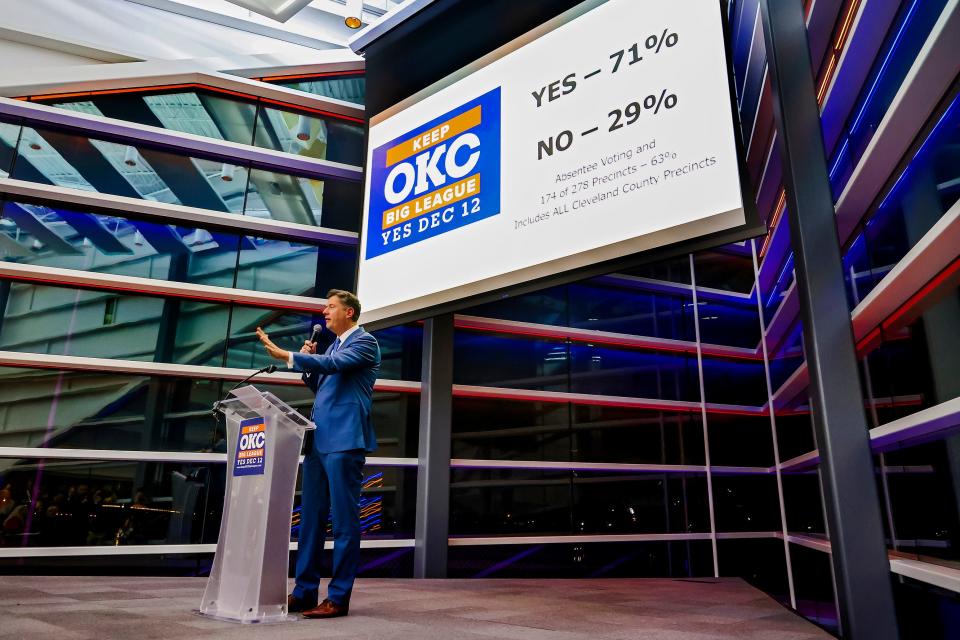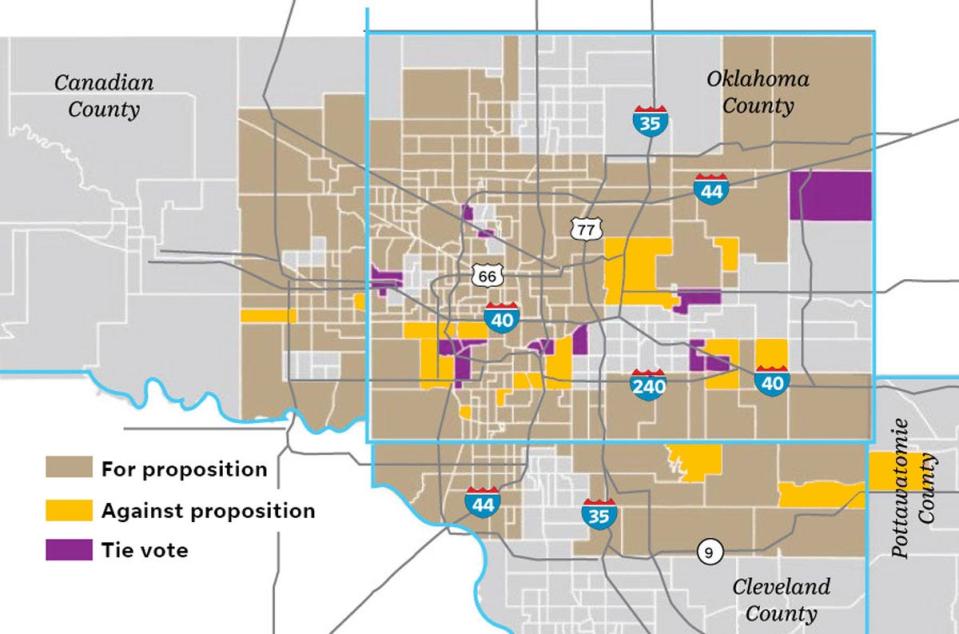Mayor, OKC Thunder celebrate as Oklahoma City votes to finance new NBA arena
- Oops!Something went wrong.Please try again later.
Oklahoma City residents overwhelmingly approved a special proposition to use at least $850 million in taxpayer funds to build a new downtown arena.
According to preliminary totals, the ballot measure passed by 71% with 41,129 yes votes and 16,797 no votes. All vote totals are unofficial until the state Election Board certifies the results.
The proposed arena is set to be built at a minimum cost of $900 million, with the majority of funds coming from a 6-year penny sales tax that would start in 2028. The Oklahoma City Thunder also would contribute $50 million, and the city would use at least $70 million in MAPS 4 funds.

A common concern among officials heading into Tuesday’s election was potentially low turnout for the vote. There were 57,926 votes tallied in the Oklahoma City ballot question, which included voters from four counties. Out of the currently 372,329 registered voters in Oklahoma City, an estimated 15.6% went to the polls, according to voter registration numbers provided to The Oklahoman by election officials.
As "yes" votes poured in, Oklahoma City Mayor David Holt took the stage at the Keep OKC Big League watch party to give a victory speech.
“Tonight, we told the nation, we told the world, that Oklahoma City is and shall remain a Big League City,” Holt said.
More: Voters overwhelmingly approve OKC arena ballot measure in preliminary results
How did each OKC precinct vote?
According to data from the state election board, each of the 278 precincts in Oklahoma City mostly reflected the total results' 70/30 split.
249 precincts had a majority of yes votes
15 precincts had a majority of no votes
14 precincts were tied

Keep OKC Big League campaign reacts to win
Tyler Moore, campaign manager for Keep OKC Big League, said Tuesday’s landslide did not represent an “either/or” ultimatum regarding the city’s ongoing projects to tackle homelessness and mental health.
“Without a ‘big league’ city, we’re less able to fix our roads, we’re less able to serve the underprivileged, we’re less able to improve our education in Oklahoma,” Moore said. “If we want to have a ‘big league’ city, we’ve got to make the investments into ourselves, and I think that’s what voters decided to do tonight, and I couldn’t feel more excited about the future of Oklahoma City.”
Moore expressed gratitude for the coalition of supporters that made up the campaign, which included various groups that traditionally had not been involved in elections.
“It was the turnout that I didn’t quite anticipate,” Moore said. “We were very pleased. It really just demonstrated that people just took the message to heart, and I thought it was a good demonstration of the nonpartisan nature of this campaign. Even at a time when we are so heavily polarized nowadays, people from every different political persuasion came out and chose Oklahoma City.”
OKC Thunder Chairman Clay Bennett 'grateful' of voters' confidence in city
OKC Thunder owner Clay Bennett released a statement Tuesday night.
“We are deeply grateful for the confidence and pride our citizens have expressed in the future of our city. We also appreciate Mayor David Holt for his leadership and relentless passion to elevate Oklahoma City at all levels," the statement read.
More: What Thunder chairman Clay Bennett, NBA commissioner Adam Silver said about OKC arena vote
Buy Your Own Arena campaign reacts to loss
Spokespeople for Buy Your Own Arena, the campaign opposing the arena proposal, said they were disappointed with Tuesday’s results, but reiterated what they described as the financial burden of the arena build to local taxpayers at the expense of other city projects.
“Mayor Holt negotiated a terrible deal, and the Chamber and their allies ran a fear-based inferiority campaign about OKC — and it worked,” said Nick Singer, spokesman for Oklahoma Progress Now, the progressive advocacy group that ran the opposition campaign. “They scared voters, and voters supported a bad deal, but it doesn’t change the fact that it’s a bad deal. It’s a 95/5 deal, and that doesn’t change just because you claim it has all of these positives, but the mayor was willing to go along with it.”
Singer told The Oklahoman the Buy Your Own Arena campaign spent less than $10,000. In contrast, the Greater Oklahoma City Chamber, which funded the pro-arena campaign, previously shared documents showing television advertising expenditures of at least $478,000 since November.
With a potential MAPS 5 now likely delayed until well into the 2030s, Singer reiterated oft-heard criticisms from other opponents of the proposition that the penny sales tax approved to fund the arena construction could be better used to address critical city needs.
“People will wonder why the streets don’t get fixed or we don’t make more progress in taking care of the homeless. It’s because of this bad deal,” Singer said. “We live in the time of the greatest income and wealth inequality in 100 years, so the last thing we need to do is to give more money to people who don’t need it.”
Cooper: Arena proposal's community benefits package valuable
Ward 2 Councilperson James Cooper, who was among the city council majority that supported the arena proposal, also spearheaded work on an additional proposal for a community benefits agreement in September. He told The Oklahoman he had considered the concerns of many who were critical of the arena proposal, but also said he wanted to remind residents how a community package could be a beneficial type of “harm reduction.”
“When I hear people say ‘no’ to the arena, I absolutely understand that, but I also see the potential to use this as a unifying force that we can rally our families and our students around,” Cooper said Tuesday evening. “This arena is yours, and you can help us build it, and you can help us, five years from now, be the ones who we connected to … apprenticeships and other resources.”
Modeled after a similar and historic agreement from the Milwaukee Bucks for use of Wisconsin’s Fiserv Forum arena, Oklahoma City’s community benefits package is expected to include provisions for a workforce intermediary and an apprenticeship program to tackle unemployment; a commitment to paying a “living wage” of $15 an hour; and a working group to study best practices for a labor peace agreement.
Cooper is also working to ensure various community organizations are represented as partners in the workforce intermediary, including Sisu, a youth social services agency, and Positive Tomorrows, a private school serving children experiencing homelessness.
Positive Tomorrows CEO Margaret Creighton encouraged residents to vote in favor of the arena proposal Tuesday, saying the Thunder had donated numerous times through philanthropy and events to support the school’s children and that the team’s international recognition had increased support from across the globe.
She also supports Cooper’s community benefits agreement, telling The Oklahoman that a living wage provision could help families afford housing and avoid homelessness.
“I’m grateful that there would be more opportunities for our families to have access to jobs that would allow them to be able to support their families,” Creighton said. “If you’re looking at people that you see as currently being homeless, the biggest misconception, in my opinion, is that they’re not working, that they’re not trying. For so many of our families, we’ve got multiple people working minimum wage jobs and it’s just not enough to make ends meet.”
Contributing: Jana Hayes, The Oklahoman
This article originally appeared on Oklahoman: Mayor Holt, OKC Thunder celebrate as city votes to finance NBA arena

